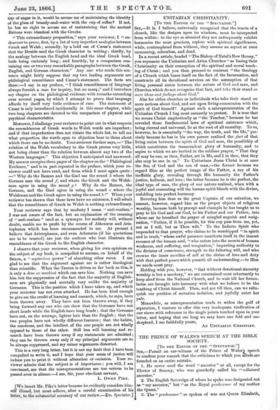UNITARIAN CHRISTIANITY.
[To THE EDITOR OF THE "SPECTATOR."] Srn,—It is, I believe, universally recognized that the tenets of a church, like the designs upon its windows, must be interpreted from within ; to the eye so situated they not unfrequently exhibit harmonies the most gracious, replete with spiritual significance, while, contemplated from without, they assume an aspect at once unmeaning, colourless, and dead.
In a recent article, headed "The Bishop of Natal's New Heresy," you represent the Unitarian and Arian Churches "as basing their Christianity on their conception of the spiritual and moral teach- ing of Christ ; and you then proceed to contrast "the theology of a Church which bases itself on the fact of the Incarnation, and constructs all its devotional services on the assumption of that living personal union between the nature of God and man, and Churches which do not recognize that fact, and take their stand on mere ideas and feelings about God."
Alas for either churches or individuals who take their stand on mere notions about God, and not upon living communion with the spirit of God himself ! Against such a misrepresentation of the Unitarian Church I beg most earnestly to protest. It is true that we revere Christ emphatically as "the Teacher," because he has revealed those fundamental laws of spiritual existence which, being eternal and universal, lie at the root of all morality. To us, however, he is essentially "the way, the truth, and the life," pre- cisely because he has in his own person realized the fact of that living union between the spirit of God and man, the possibility of which constitutes the transcendent glory of humanity, and to aspire to which we are invited in the sublime prayer, "That they all may be one, as thou, Father, art in Me, and I in thee, that they also may be one in us." To Unitarians Jesus Christ is at once the Son of God and the son of man,—the former because we regard Him as the perfect image of the Father, a ray of his ineffable glory, revealing through His humanity the Father's justice, holiness, and love ; the latter because he is the perfect, the ideal type of man, the glory of our nature realized, when with joyful and consenting will the human spirit blends with the divine, unfolding into perfect harmony.
Revering him thus as the great Captain of our salvation, we cannot, however, regard him as the proper objects of religious worship, because both by precept and example he has taught us to pray to his God and our God, to his Father and our Father, into whose ear he breathed the prayer of mingled anguish and resig- nation, "Father, if it be possible, let this cup pass from me, yet, not as I will, but as Thou wilt." To the Infinite Spirit who responded to that prayer, who claims to be worshipped "in spirit and in truth," whose awful presence manifests itself in the inmost recesses of the human soul, "who enters into the secrets of human weakness, and suffering, and temptation," imparting authority to the dictates of conscience, strength to the faltering will, and who crowns the inner sacrifice of self at the shrine of love and duty with that perfect peace which passeth all understanding,—to Him we needs must pray.
Holding with you, however, "that without devotional sincerity worship is but a mockery," we are constrained most reluctantly to keep aloof from the National Church, and to wait till her formu- laries are brought into harmony with what we believe to be the teaching of Christ himself. Then, and not till then, can we relin- quish our position of sectarian isolation, and joyfully enter her pale.
Meanwhile, as misrepresentation tends to widen the gulf of separation, I venture to offer this very inadequate vindication of our views with reference to the single points touched upon in your letter, and hoping that ere long we may have one fold and one shepherd, I ara faithfully yours,
AN UNITARIAN CHRISTIAN.






























 Previous page
Previous page